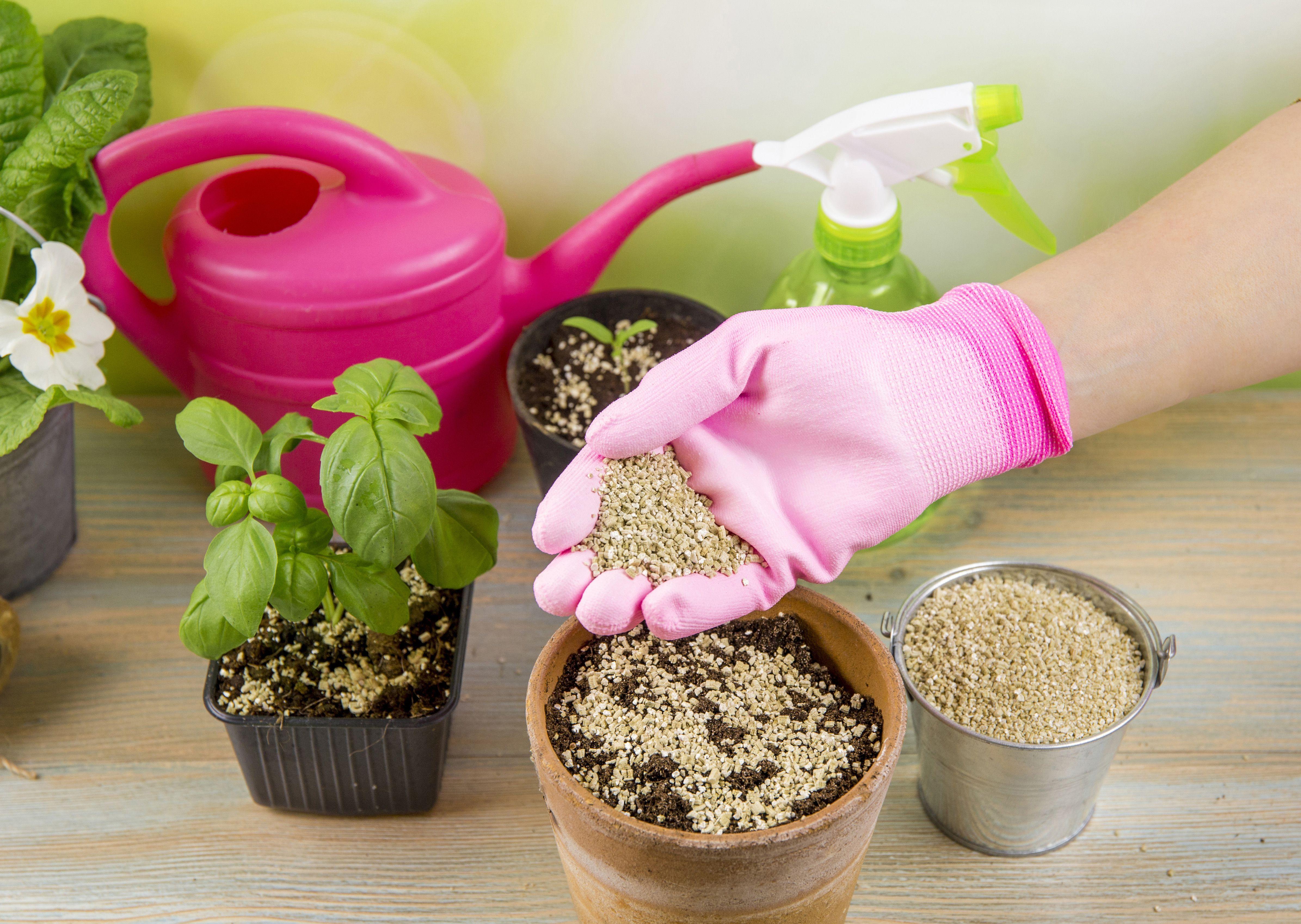Key Points
- Vermiculite is a natural material commonly used in potting soil or by itself to help provide ideal amounts of water and air to plants.
- Compared to perlite, another common potting mix amendment, vermiculite is better for keeping soil moist and perlite is better for aeration.
- While vermiculite is usefully for plants that require steady moisture, it's not a good choice for plants that prefer drier conditions.
You’ve probably heard of vermiculite, but confusion surrounds what it is, whether it’s toxic, what to use it for, and if you should avoid it. The quick answer is that vermiculite can be a valuable addition to potting soil. You can buy vermiculite at garden centers for use as a soil amendment, and it's also used by nursery growers and plant propagators. This guide explains the pros and cons of vermiculite for gardening so you can decide if it's something you want to use or not.
How Vermiculite Is Made
Vermiculite is a naturally occurring material—sort of. Vermiculite is made from a mined mineral that is then heated in an industrial furnace, which causes the mineral to expand dramatically like popcorn. It increases many times in volume and becomes lighter and fluffier. Vermiculite is graded into several size classes, with the largest size best suited for large planters and raised garden beds, while the finer grades are suitable for starting seeds and propagating cuttings.
When to Use Vermiculite
Gardeners add vermiculite to potting soil to improve moisture retention and aeration. The water-holding ability of vermiculite reduces the issue of potted plants drying out too quickly, especially in summer. It’s a great way to keep the soil moist for plants without overwatering and causing saturated conditions, which can suffocate roots and lead to root rot. And because roots have access to water for longer, watering frequency is reduced.
Vermiculite’s light weight also helps keep the soil loose and aerated, allowing air to reach the root system. Roots need oxygen to respirate just like we do, and dense, compact soil inhibits that process.
While vermiculite is commonly used as an amendment to potting mixes, some gardeners start seeds in pure vermiculite, transplanting them into other media later after they’ve sprouted. Propagation by cuttings frequently uses vermiculite to keep the cutting tip moist while allowing airflow.
How does vermiculite provide both air and moisture? It has a layered structure, like the folds of an accordion. Its presence increases air pockets and channels in the soil, which increases porosity in heavy clay or compact soils and helps the soil drain better. While it’s doing that, it absorbs many times its weight in water, slowly releasing it back to the soil as the surrounding soil dries out.
Photo: Marty Baldwin
Perlite vs. Vermiculite
Perlite is another common soil additive used in potting mixes. Perlite (shown on bottom of the photo above) is a volcanic rock that expands under high heat to become a white, fluffy, crunchy substance that looks similar to polystyrene (Styrofoam). It is primarily used to improve drainage and aeration.
Adding perlite creates a lighter, fluffier potting mix that remains loose and breathable, allowing plenty of oxygen to reach the roots of potted plants. While vermiculite (shown on top left of the photo above) also improves heavy or compacted soil conditions, its main use is in water retention to improve the moisture content of the potting mix and even out the sometimes extreme wet-dry cycles.
In general, vermiculite is better for moisture retention and perlite for aeration. However, many gardeners use both.
Related
Vermiculite Pros and Cons
While vermiculite can be an important and helpful soil amendment, it isn’t perfect. When deciding if you’d like to add vermiculite to your mix, consider the following.
Pros
- Water retention is vermiculite’s strong point. It can absorb many times its weight in water and release it slowly over time, creating evenly moist conditions.
- Vermiculite holds on to important plant nutrients like potassium, calcium, and magnesium, stopping them from being leached out with water.
- When added to potting mix or garden soil, vermiculite enhances aeration, which allows more oxygen to reach the roots and is the reason gardeners say vermiculite enhances root growth.
- Vermiculite used in seed-starting mixes and as a top dressing when starting seeds greatly reduces problems with damping off, a fungal problem common in seedlings.
Cons
- Vermiculite can retain too much water for plants that thrive in drier conditions. Succulents, cacti, and Mediterranean herbs like rosemary can suffer from increased soil moisture provided by vermiculite.
- Due to the industrial process required, vermiculite is more expensive than many other soil amendments.
- Vermiculite is a non-renewable resource mined from the earth.
Frequently Asked Questions
-
Not unless you found a 30-year-old bag. Horticultural vermiculite is mined with strict industry protocols and monitoring and is asbestos-free. The mine that caused the vermiculite-asbestos problem was located in Libby, Montana, and closed in 1990.
-
Root rot depends more on your watering frequency than whether or not you added vermiculite. While vermiculite retains water, it doesn't cause root rot when used properly. However, overwatering combined with potting mix recipes heavy in vermiculite could cause issues.
-
Dry vermiculite, especially the finer grades, is dusty when poured out of the bag. To reduce the dust issue, mix a little water with the vermiculite when you are ready to use it, handle it outdoors if possible, or wear a dust mask. Scooping a few cups of vermiculite out of a bag to mix by hand into your potting mix usually won’t raise much dust.



